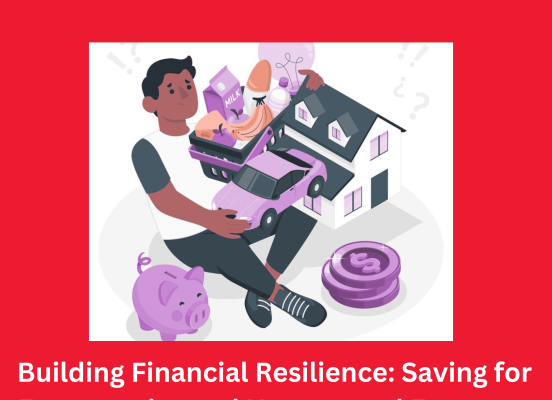
Building Financial Resilience: Saving for Emergencies and Unexpected Expenses
- By admin --
- Thursday, 14 Mar, 2024
Introduction:
Life is full of uncertainties, and unexpected expenses can arise at any moment, from medical emergencies to car repairs or sudden job loss. To navigate these challenges and maintain financial stability, it's essential to establish an emergency fund. In this guide, we'll explore the importance of saving for emergencies, strategies for building an emergency fund, and tips for effectively managing unexpected expenses.
Understanding the Need for an Emergency Fund:
An emergency fund serves as a financial safety net, providing individuals with a cushion to cover unforeseen expenses without resorting to high-interest debt or depleting long-term savings. Whether it's a medical emergency, home repair, or temporary loss of income, having a dedicated emergency fund can help mitigate financial stress and prevent financial setbacks.
-
Importance of Saving for Emergencies:
- Financial Stability: An emergency fund ensures that you have the necessary funds to cover unexpected expenses without jeopardizing your financial stability.
- Peace of Mind: Knowing that you have a safety net in place can alleviate stress and anxiety associated with unforeseen financial challenges.
- Avoidance of Debt: Having savings readily available can prevent reliance on credit cards or loans to cover emergencies, saving you from high-interest debt.
-
Setting Financial Goals:
- Determine the Size of Your Emergency Fund: Financial experts often recommend saving three to six months' worth of living expenses in an emergency fund, although the ideal amount may vary based on individual circumstances.
- Assess Your Risk Factors: Consider factors such as job stability, health, and potential expenses to determine an appropriate target for your emergency fund.
Strategies for Building an Emergency Fund:
Building an emergency fund requires discipline, commitment, and strategic planning. By implementing the following strategies, you can gradually accumulate savings and strengthen your financial resilience.
-
Pay Yourself First:
- Treat your emergency fund as a non-negotiable expense and prioritize saving a portion of your income each month.
- Set up automatic transfers from your paycheck or checking account to a designated savings account dedicated to your emergency fund.
-
Start Small and Be Consistent:
- Begin by setting achievable savings goals, even if it means starting with a modest amount.
- Consistently contribute to your emergency fund, even if it means making small, incremental deposits over time.
-
Cut Expenses and Increase Income:
- Review your budget and identify areas where you can cut discretionary spending.
- Consider ways to increase your income, such as taking on a side hustle or freelancing gig, to boost your savings rate.
-
Windfalls and Bonuses:
- Allocate unexpected windfalls, such as tax refunds or work bonuses, towards your emergency fund rather than splurging on non-essential expenses.
Managing Unexpected Expenses:
Despite careful planning, unexpected expenses can still arise. When faced with unforeseen financial challenges, consider the following tips for effectively managing unexpected expenses:
-
Assess the Situation:
- Evaluate the nature and urgency of the expense to determine the best course of action.
- Prioritize essential expenses such as medical bills, utilities, or home repairs that pose immediate risks to your well-being or safety.
-
Use Your Emergency Fund:
- If you have an established emergency fund, use it to cover unexpected expenses without incurring debt or depleting other savings accounts.
-
Explore Alternative Payment Options:
- Consider negotiating payment plans or seeking assistance programs offered by service providers or creditors.
- Look into low-interest financing options or personal loans as alternatives to high-interest credit cards if necessary.
-
Adjust Your Budget:
- Temporarily adjust your budget to accommodate unexpected expenses, reallocating funds from non-essential categories to cover immediate needs.
Conclusion:
Saving for emergencies and unexpected expenses is a fundamental aspect of financial planning, providing individuals with the resilience to navigate life's uncertainties. By establishing an emergency fund, setting achievable savings goals, and implementing strategies for building financial resilience, you can safeguard your financial well-being and prepare for whatever challenges may arise. Remember that building an emergency fund is a gradual process that requires patience, discipline, and commitment, but the peace of mind and financial security it provides are invaluable in times of need.





